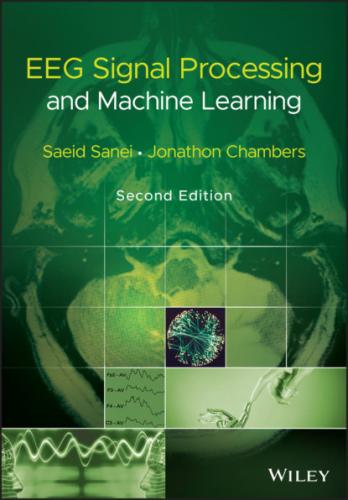3 Chapter 3Figure 3.1 (a) A network of three neurons that exchange electric signals, na...Figure 3.2 A pair of oscillators weakly coupled via the perturbation functio...Figure 3.3 The Hodgkin–Huxley excitation model.Figure 3.4 A single AP in response to a transient stimulation based on the H...Figure 3.5 The AP from a Hodgkin–Huxley oscillatory model with reduced maxim...Figure 3.6 Simulation of an AP within the Morris–Lecar model. The model para...Figure 3.7 An illustration of the bursting behaviour that can be generated b...Figure 3.8 A nonlinear lumped model for generating the rhythmic activity of ...Figure 3.9 The local EEG model (LEM). The thalamocortical relay neurons are ...Figure 3.10 Simplified model for brain cortical alpha generation. The input ...Figure 3.11 A two‐column model for generation of VEP. Two connectivity const...Figure 3.12 A linear model for the generation of EEG signals.Figure 3.13 Mixture of Gaussian (dotted curves) models of a multimodal unkno...Figure 3.14 The Lewis membrane model [57].Figure 3.15 Circuits simulating (a) potassium and (b) sodium conductances in...Figure 3.16 The Lewis neuron model from 1968 [57].Figure 3.17 The Harmon neuron model [60].Figure 3.18 The Lewis model for simulation of the propagation of the action ...
4 Chapter 4Figure 4.1 An EEG set of tonic–clonic seizure signals including three segmen...Figure 4.2 (a) An EEG seizure signal including preictal, ictal, and posticta...Figure 4.3 Single‐channel EEG spectrum. (a) A segment of an EEG signal with ...Figure 4.4 TF representation of an epileptic waveform in (a) for different t...Figure 4.5 Morlet's wavelet: real and imaginary parts shown respectively in ...Figure 4.6 Mexican hat wavelet.Figure 4.7 The filter bank associated with the multiresolution analysis.Figure 4.8 (a) A segment of a signal consisting of two modulated components,...Figure 4.9 Illustration of
5 Chapter 5Figure 5.1 Separation of EMG and ECG using the SSA technique; top signal is ...Figure 5.2 BSS concept; mixing and blind separation of the EEG signals.Figure 5.3 A sample of an EEG signal simultaneously recorded with fMRI.Figure 5.4 The EEG signals after removal of the scanner artefact.Figure 5.5 Estimated independent components of a set of EEG signals, acquire...Figure 5.6 Topographic maps, each illustrating an IC. It is clear that the s...Figure 5.7 Tensor and its various modes.Figure 5.8 Tensor factorization using: (a) Tucker and (b) PARAFAC models.Figure 5.9 A tensor representation of a set of multichannel EEG signals. (a)...Figure 5.10 The extracted factors using STF–TS modelling. (a) and (b) illust...Figure 5.11 Restoration of the EEG signals in (a) from multiple eye blinks a...Figure 5.12 Representation of the first two components (a, b) in the time–sp...Figure 5.13 The results of application of the FOBSS algorithm to a set of sc...Figure 5.14 The intracranial records from three electrodes. These signals we...
6 Chapter 6Figure 6.1 Generated chaotic signal using the model x(n) → αx(n)(1 − x(Figure 6.2 The attractors for (a) a sinusoid and (b) the above chaotic time ...Figure 6.3 The reference and the model trajectories, evolution of the error,...Figure 6.4 (a) The signal and (b) prediction order measured for overlapping ...
7 Chapter 7Figure 7.1 A two‐dimensional feature space with three clusters, each with me...Figure 7.2 Schematic diagram of deep clustering [16]. The deep features are ...Figure 7.3 An example of a decision tree to show the humidity level at 9:00 ...Figure 7.4 The SVM separating hyperplane and support vectors for a separable...Figure 7.5 Soft margin and the concept of a slack parameter.Figure 7.6 Nonlinear discriminant hyperplane (separation margin) for SVM.Figure 7.7 Output class distributions for (a) close to zero and (b) non‐zero...Figure 7.8 A biological neuron that
